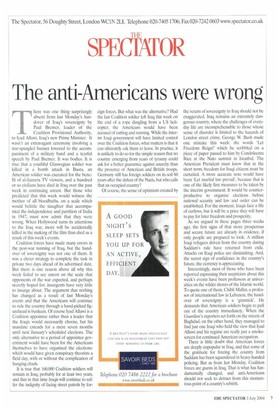The anti-Americans were wron
r here was one thing surprisingly
absent from last Monday's hanclover of Iraq's sovereignty by Paul Bremer, leader of the Coalition Provisional Authority, to Iyad Allawi, Iraq's new Prime Minister. It wasn't an extravagant ceremony involving a star-spangled banner lowered to the accompaniment of a military band and a tearful speech by Paul Bremer. It was bodies. It is true that a youthful Glaswegian soldier was killed in a bomb attack in Basra, an American soldier was executed for the benefit of al-Jazeera TV viewers, and a hundred or so civilians have died in Iraq over the past week in continuing unrest. But those who predicted that this week would witness the mother of all bloodbaths, on a scale which would belittle the slaughter that accompanied the independence and partition of India in 1947, must now admit that they were wrong. When Hollywood turns its attentions to the Iraq war, more will be accidentally killed in the making of the film than died as a result of this week's events.
Coalition forces have made many errors in the post-war running of Iraq, but the handover of sovereignty was not one of them. It was a clever strategy to complete the task in private two days ahead of its advertised date. But there is one reason above all why this week failed to see unrest on the scale that opponents of the war expected, and perhaps secretly hoped for: insurgents have very little to insurge about The argument that nothing has changed as a result of last Monday's events and that the Americans will continue to rule the country through a hand-picked figurehead is bunkum. Of course Iyad Allawi is a Coalition appointee rather than a leader that the Iraqis would necessarily choose, but his mandate extends for a mere seven months until next January's scheduled elections. The only alternative to a period of appointee government would have been for the Americans themselves to have organised the elections: which would have given conspiracy theorists a field day, with or without the complication of hanging chads.
It is true that 160,000 Coalition soldiers will remain in Iraq, probably for at least two years, and that in that time Iraqis will continue to suffer the indignity of facing street patrols by for
eign forces. But what was the alternative? Had the last Coalition soldier left Iraq this week on the end of a rope dangling from a US helicopter, the Americans would have been accused of cutting and running. While the interim Iraqi government will have limited control over the Coalition forces, what matters is that it can ultimately ask them to leave. In practice, it is unlikely to do so for the simple reason that no country emerging from years of tyranny could ask for a better guarantee against anarchy than the presence of American and British troops. Germany still has foreign soldiers on its soil 60 years after the defeat of the Nazis, but who calls that an occupied country?
Of course, the sense of optimism created by the return of sovereignty to Iraq should not be exaggerated. Iraq remains an extremely dangerous country, where the challenges of everyday life are incomprehensible to those whose sense of disorder is limited to the hazards of London street crime. George W. Bush made one mistake this week: the words 'Let Freedom Reign!' which he scribbled on a piece of paper passed to him by Condoleezza Rice at the Nato summit in Istanbul. The American President must know that in the short term, freedom for Iraqi citizens must be curtailed. A more accurate note would have been `Let martial law prevail', because that is one of the likely first measures to be taken by the interim government. It would be counterproductive to organise elections before national security and law and order can be established. For the moment. Iraqis face a life of curfews, but it will be a price they will have to pay for later freedom and prosperity.
As we argued in these pages three weeks ago, the first signs of that more prosperous and secure future are already in evidence, if only people are prepared to look. A million Iraqi refugees driven from the country during Saddam's rule have returned from exile. Attacks on Iraqi police are diminishing. And, the surest sign of confidence in the country's future, the currency is appreciating.
Interestingly, most of those who have been reported expressing their scepticism about this week's events have been professors at universities on the wilder shores of the Islamic world. To quote one of them, Chibli Mallat, a professor of international law in Lebanon, the handover of sovereignty is a 'gimmick'. He demands that American soldiers begin to pull Out of the country immediately. When the Guardian's reporters set forth on the streets of Baghdad, on the other hand, they managed to find just one Iraqi who held the view that Iyad Allawi and his regime are really just a smokescreen for continued American occupation.
There is little doubt that American forces are deeply unpopular in Iraq, and that some of the gratitude for freeing the country from Saddam has been squandered in heavy-handed policing. But as from last Monday, Coalition forces are guests in Iraq. That is what has fundamentally changed, and anti-Americans should not seek to detract from this momentous point of a country's rebirth.


































































 Previous page
Previous page